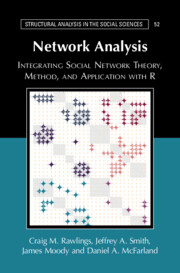Book contents
- Network Analysis
- Structural Analysis in the Social Sciences
- Network Analysis
- Copyright page
- Contents
- Figures
- Tables
- Acknowledgments
- 1 Introduction
- Part I Thinking Structurally
- Part II Seeing Structure
- Part III Making Structural Predictions
- 13 Models for Networks
- 14 Models for Network Diffusion
- 15 Models for Social Influence
- 16 Conclusion
- References
- Index
- References
13 - Models for Networks
from Part III - Making Structural Predictions
Published online by Cambridge University Press: 21 September 2023
- Network Analysis
- Structural Analysis in the Social Sciences
- Network Analysis
- Copyright page
- Contents
- Figures
- Tables
- Acknowledgments
- 1 Introduction
- Part I Thinking Structurally
- Part II Seeing Structure
- Part III Making Structural Predictions
- 13 Models for Networks
- 14 Models for Network Diffusion
- 15 Models for Social Influence
- 16 Conclusion
- References
- Index
- References
Summary
Where do networks come from? Numerous theories direct us to the causes of networks (e.g., homophily, triadic closure, physical proximity), some emphasizing outside factors (exogenous causes) and others emphasizing point-in-time network structure (endogenous causes) as shaping a network’s future trajectory. So far, we have examined such causal theories using cross-sectional snapshots in the form of metrics (centrality, density), partitions (clusters), and maps or spaces (visualization). These approaches generally suffer from a lack of stochastic features and observational overdetermination: for example, we observe a pattern in a given school on a given day, but that pattern could result from actor preferences and constraints in the setting. Disentangling such effects requires an inferential approach to probabilistically examine various effects. To the extent that we want to identify causal forces shaping the networks, understanding the unfolding of relations in time – how the individual ties in a network (the dyads joined by one or more relations) and the entire structure of these relations emerge and evolve – is crucial for testing network theories.
Information
- Type
- Chapter
- Information
- Network AnalysisIntegrating Social Network Theory, Method, and Application with R, pp. 301 - 339Publisher: Cambridge University PressPrint publication year: 2023
